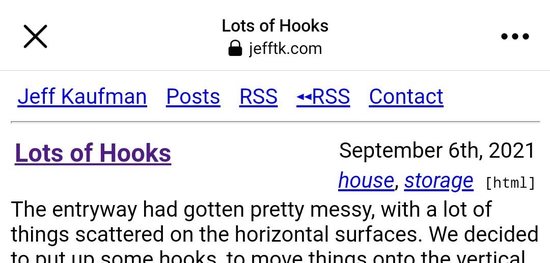Selecting the Default Browser in Facebook on Android |
September 8th, 2021 |
| browser, tech |
Use the user's default browser. You leave the app entirely, and switch to the browser. History, logins, autofill, etc work as the user expects.
(Android only) Use a "custom tab". Same as #1, except the app has a bit of control over appearance (bottom toolbar, custom menu, etc). Also some apps [shakes fist] don't respect your default browser, and always use Chrome for the tab.
Use an "in-app browser". It is as if the app has implemented their own web browser, where you are logged out of every site, history is not shared, and they are able to inject arbitrary JavaScript into the pages you visit.
I mildly prefer #1 over #2, but strongly prefer either to #3. In-app browsers add friction with no benefit, don't respect user choice, make it harder for Firefox etc, and are insecure (more).
If you click on an external link in Facebook for Android, you'll get something like:
That's their in-app browser. You might think to turn it off you could click the three dots:
And "Go to Settings":
There used to be an option here to turn off the in-app browser, but now the only options are to configure it. Dead end.
To turn it off you need to go back to the Facebook home screen, go into "Settings & Privacy", and click "Media":
At the bottom of the page there's an option for "Links open externally":
While I wish Facebook just used the default browser, moving the setting to somewhere unreachable from the in-app browser is somewhere between "intentionally user-hostile" and "failure to think about how users interact with browser choice settings".
Comment via: facebook, lesswrong




